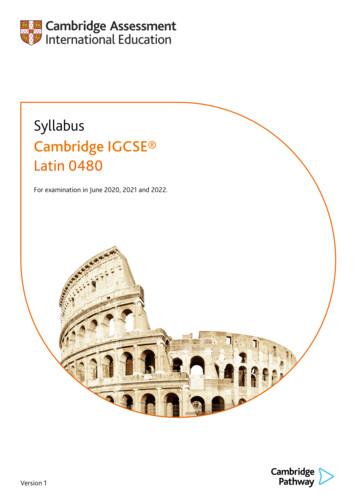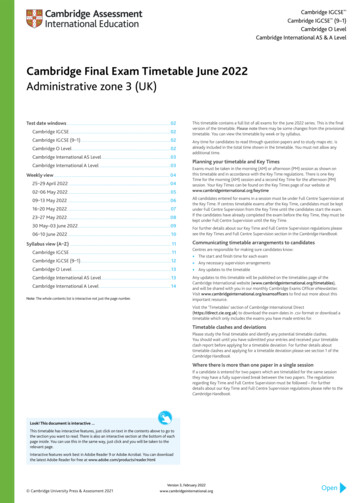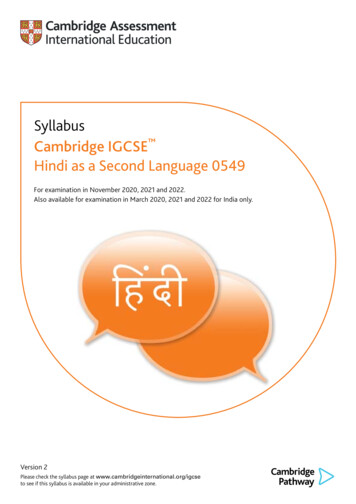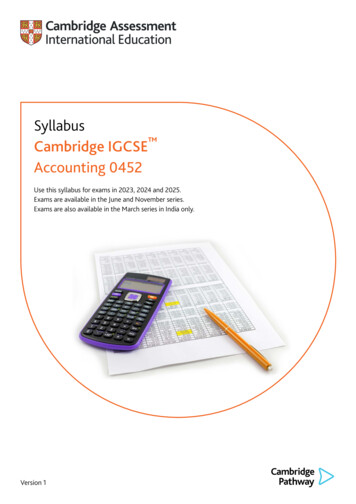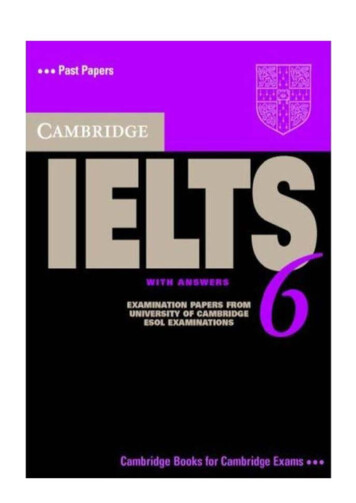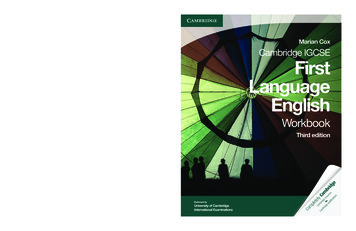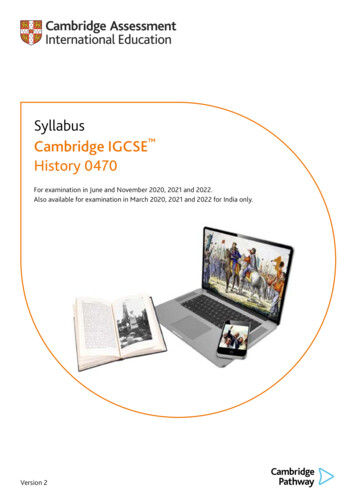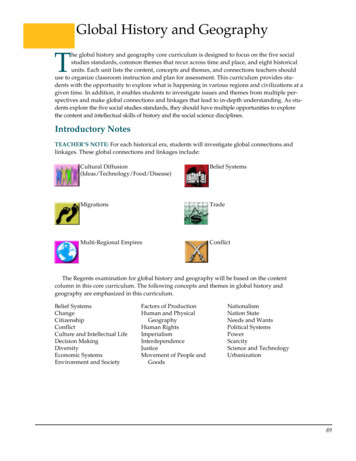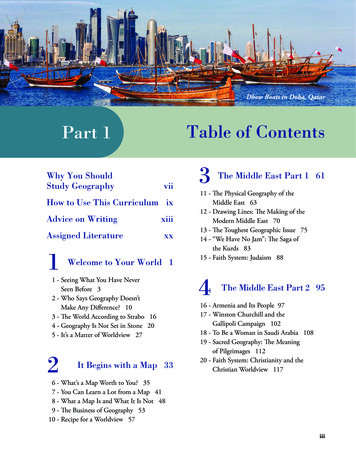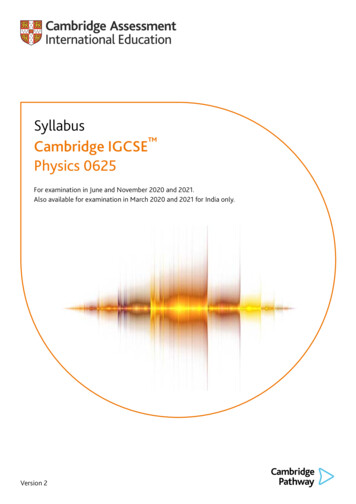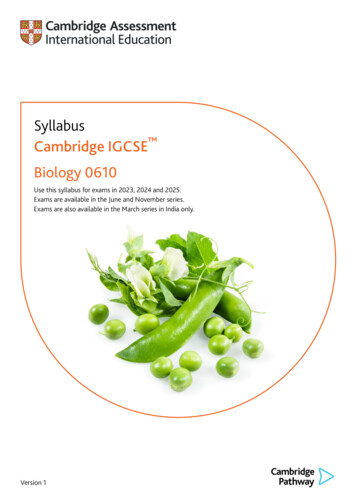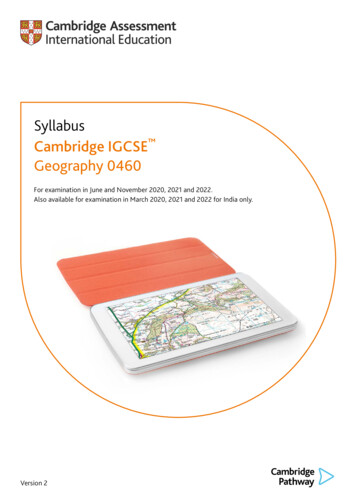
Transcription
SyllabusCambridge IGCSE Geography 0460For examination in June and November 2020, 2021 and 2022.Also available for examination in March 2020, 2021 and 2022 for India only.Version 2
Why choose Cambridge?Cambridge Assessment International Education prepares school students for life, helping them develop an informedcuriosity and a lasting passion for learning. We are part of the University of Cambridge.Our international qualifications are recognised by the world’s best universities and employers, giving students awide range of options in their education and career. As a not-for-profit organisation, we devote our resources todelivering high-quality educational programmes that can unlock learners’ potential.Our programmes and qualifications set the global standard for international education. They are created by subjectexperts, rooted in academic rigour and reflect the latest educational research. They provide a strong platform forlearners to progress from one stage to the next, and are well supported by teaching and learning resources.Our mission is to provide educational benefit through provision of international programmes and qualifications forschool education and to be the world leader in this field. Together with schools, we develop Cambridge learnerswho are confident, responsible, reflective, innovative and engaged – equipped for success in the modern world.Every year, nearly a million Cambridge students from 10 000 schools in 160 countries prepare for their future withan international education from Cambridge International.‘We think the Cambridge curriculum is superb preparation for university.’Christoph Guttentag, Dean of Undergraduate Admissions, Duke University, USAQuality managementOur systems for managing the provision of international qualifications and education programmesfor students aged 5 to 19 are certified as meeting the internationally recognised standard forquality management, ISO 9001:2008. Learn more at www.cambridgeinternational.org/ISO9001Cambridge Assessment International Education is part of the Cambridge Assessment Group. Cambridge Assessment is the brand name ofthe University of Cambridge Local Examinations Syndicate (UCLES), which itself is a department of the University of Cambridge.UCLES retains the copyright on all its publications. Registered centres are permitted to copy material from this booklet for their owninternal use. However, we cannot give permission to centres to photocopy any material that is acknowledged to a third party even forinternal use within a centre.
Contents1 Why choose this syllabus? . 22 Syllabus overview . 5Aims5Content overview5Assessment overview6Assessment objectives73 Subject content .9Resources9Case studies9Theme 1: Population and settlement10Theme 2: The natural environment13Theme 3: Economic development16Using mathematical skills in geography184 Details of the assessment .19Paper 1 – Geographical Themes19Paper 2 – Geographical Skills20Component 3 – Coursework23Paper 4 – Alternative to Coursework29Coursework assessment32Coursework guidance notes34Command words355 What else you need to know . 36Before you start36Making entries37After the exam38How students and teachers can use the grades38Grade descriptions38Changes to this syllabus for 2020, 2021 and 202239Changes to this syllabusFor information about changes to this syllabus for 2020, 2021 and 2022, go to page 39.The latest syllabus is version 2, published October 2020. There are no significant changes which affect teaching.Any textbooks endorsed to support the syllabus for examination from 2016 are still suitable for use with thissyllabus.
Cambridge IGCSE Geography 0460 syllabus for 2020, 2021 and 2022.1 Why choose this syllabus?Key benefitsCambridge IGCSE syllabuses are created especially for international students. For over 25 years, we have workedwith schools and teachers worldwide to develop syllabuses that are suitable for different countries, different typesof schools and for learners with a wide range of abilities.Successful Cambridge IGCSE Geography candidates develop lifelong skills, including: an understanding of the processes which affect physical and human environments an understanding of location on a local, regional and global scale the ability to use and understand geographical data and information an understanding of how communities around the world are affected and constrained by differentenvironments.Our programmes balance a thorough knowledge and understanding of a subject and help to develop the skillslearners need for their next steps in education or employment.Our approach encourages learners to be:Cambridgelearner‘The strength of Cambridge IGCSE qualifications is internationally recognised and has providedan international pathway for our students to continue their studies around the world.’Gary Tan, Head of Schools and CEO, Raffles International Group of Schools, Indonesia2www.cambridgeinternational.org/igcseBack to contents page
Cambridge IGCSE Geography 0460 syllabus for 2020, 2021 and 2022. Why choose this syllabus?Recognition and progressionThe combination of knowledge and skills in Cambridge IGCSE Geography gives learners a solid foundation forfurther study. Candidates who achieve grades A* to C are well prepared to follow a wide range of courses includingCambridge International AS & A Level Geography.Cambridge IGCSEs are accepted and valued by leading universities and employers around the world as evidence ofacademic achievement. Many universities require a combination of Cambridge International AS & A Levels andCambridge IGCSEs or equivalent to meet their entry requirements.UK NARIC, the national agency in the UK for the recognition and comparison of international qualifications andskills, has carried out an independent benchmarking study of Cambridge IGCSE and found it to be comparable tothe standard of GCSE in the UK. This means students can be confident that their Cambridge IGCSE qualificationsare accepted as equivalent to UK GCSEs by leading universities worldwide.Learn more at idge IGCSE is one of the most sought-after and recognised qualifications in the world. Itis very popular in Egypt because it provides the perfect preparation for success at advanced levelprogrammes.’Mrs Omnia Kassabgy, Managing Director of British School in Egypt BSEBack to contents pagewww.cambridgeinternational.org/igcse3
Cambridge IGCSE Geography 0460 syllabus for 2020, 2021 and 2022. Why choose this syllabus?Supporting teachersWe provide a wide range of practical resources, detailed guidance, and innovative training and professionaldevelopment so that you can give your learners the best possible preparation for Cambridge IGCSE.Teaching resourcesExam preparation resources The School Support Hubwww.cambridgeinternational.org/support Question papers Syllabus Scheme of work Example candidate responses to understandwhat examiners are looking for at key grades Learner guide Examiner reports to improve future teaching Mark schemes Discussion forum Resource list Endorsed textbooks and digital resourcesTraining Face-to-face workshops around the world Online self-study training Online tutor-led training Cambridge Professional al.org/igcseSupport forCambridgeIGCSECommunityYou can find useful information, as well asshare your ideas and experiences with otherteachers, on our social media channels andcommunity forums.Find out more atwww.cambridgeinternational.org/social-mediaBack to contents page
Cambridge IGCSE Geography 0460 syllabus for 2020, 2021 and 2022.2 Syllabus overviewAimsThe aims describe the purposes of a course based on this syllabus.The aims are to enable students to: an understanding of location on a local, regional and global scale an awareness of the characteristics, distribution and processes affecting contrasting physical and humanenvironments an understanding of the ways in which people interact with each other and with their environment an awareness of the contrasting opportunities and constraints presented by different environments an appreciation of and concern for the environment an appreciation of the earth including its people, places, landscapes, natural processes and phenomena.Content overviewThe syllabus is divided into three themes:Theme 1: Population and settlementTheme 2: The natural environmentTheme 3: Economic development.The themes are designed to develop an understanding of natural and human environments.Support for Cambridge IGCSE GeographyOur School Support Hub www.cambridgeinternational.org/support provides Cambridge schools with asecure site for downloading specimen and past question papers, mark schemes, grade thresholds and othercurriculum resources specific to this syllabus. The School Support Hub community offers teachers theopportunity to connect with each other and to ask questions related to the syllabus.Back to contents pagewww.cambridgeinternational.org/igcse5
Cambridge IGCSE Geography 0460 syllabus for 2020, 2021 and 2022. Syllabus overviewAssessment overviewAll candidates take three papers. All candidates take Paper 1 and Paper 2, and either Component 3 or Paper 4.All candidates take:Paper 1Geographical Themes1 hour 45 minutes45%75 marks, weighted to 100 marksCandidates answer three questions, eachworth 25 marks. Candidates must answer onequestion from each sectionExternally assessedand:Paper 2Geographical Skills1 hour 30 minutes27.5%60 marksCandidates answer all the questionsExternally assessedand either:Component 3Courseworkor:27.5%Paper 41 hour 30 minutesAlternative to Coursework27.5%60 marks60 marksTeachers set one centre-based assignment ofup to 2000 wordsCandidates answer two compulsory questions,completing a series of written tasksCentre-based assessment*Externally assessed* Centre-based assessments require the written approval of Cambridge International. This will only be given toteachers who satisfy Cambridge International requirements concerning moderation. Cambridge International offersschools in-service training courses which are held in Cambridge and k to contents page
Cambridge IGCSE Geography 0460 syllabus for 2020, 2021 and 2022. Syllabus overviewAssessment objectivesThe assessment objectives (AOs) are:AO1 Knowledge with understandingCandidates should be able to demonstrate knowledge and understanding of: the wide range of processes, including human actions, contributing to the development of(a) physical, economic and social environments and their effects on the landscape(b) spatial patterns and interactions which are important within these environments the relationships between human activity and the environment the importance of scale (whether local, regional or global) the changes which occur through time in places, landscapes and spatial distribution.AO2 Skills and analysisCandidates should be able to: interpret and analyse geographical data use and apply geographical knowledge and understanding to maps and in numerical, diagrammatic, pictorial,photographic and graphical form use geographical data to recognise patterns in such data and to deduce relationships select and show understanding of techniques for observing and collecting data select and use techniques for organising and presenting data.AO3 Judgement and decision-makingThrough their geographical training, candidates should be able to: reason and make judgements and decisions, including evaluation and conclusions, which demonstrate, whereappropriate(a) an appreciation of the attitudes, values and beliefs of others in issues which have a geographical dimension(b) an awareness of the contrasting opportunities and constraints of people living in different places and underdifferent physical and human conditions(c) a willingness to review their own attitudes in the light of the views of others and new knowledge acquired make judgements and decisions and recognise how these are made within a geographical context as affectedand constrained by(a) the physical and human contexts in which decisions are made(b) the values and perceptions of differing groups or individuals(c) the choices available to decision-makers(d) the increasing level of global interdependence and the need for sustainable development.Back to contents pagewww.cambridgeinternational.org/igcse7
Cambridge IGCSE Geography 0460 syllabus for 2020, 2021 and 2022. Syllabus overviewWeighting for assessment objectivesThe approximate weightings allocated to each of the assessment objectives (AOs) are summarised below.Assessment objectives as a percentage of the qualificationAssessment objectiveWeighting in IGCSE %AO1 Knowledge with understanding30AO2 Skills and analysis52AO3 Judgement and decision-making18Assessment objectives as a percentage of each componentAssessment objective8Weighting in components %Paper 1Paper 2Component 3and Paper 4AO1 Knowledge with understanding481120AO2 Skills and analysis308060AO3 Judgement and /igcseBack to contents page
Cambridge IGCSE Geography 0460 syllabus for 2020, 2021 and 2022.3 Subject contentThe subject content is arranged into the three themes: Population and settlement The natural environment Economic development.The content listed is exhaustive except where the word ‘including’ is used. Where ‘including’ is used, candidatesmust study everything in the list but may also study other relevant aspects. For example: in Topic 2.3, all the coastal landforms you must cover are listed in Topic 2.5, where ‘including’ is used, you may choose to introduce other climatic characteristics as well as theones listed.ResourcesSome questions in all the written papers are based on resource material, such as photographs, map extracts,satellite images, drawings, diagrams, graphs, text extracts, statistics and tables of data.To meet the aims of an international syllabus and examination, resource materials come from various areas of theworld. Candidates may not be familiar with the world areas used in the resources. The questions do not requirespecific regional knowledge. The resources are designed to prompt candidates to use the general principles theyhave studied.The units used in all resources and papers are: metres and kilometres for height and distance degrees centigrade for temperature.Questions in all papers may include references to latitude or longitude.Case studiesWhere a case study is specified in a topic, teachers should choose a suitable example to illustrate the subjectcontent. For example, Topic 1.6 requires a case study of an urban area. The case study can be from anywhere in theworld but it must illustrate all the content listed under Topic 1.6.You can choose more than one case study for a topic. For example, for Topic 1.6 you could choose Settlement X fora case study on land use and Settlement Y for a case study on urban problems.You can also use the same case study for more than one topic as long as it is suitable for the subject content.Back to contents pagewww.cambridgeinternational.org/igcse9
Cambridge IGCSE Geography 0460 syllabus for 2020, 2021 and 2022. Subject contentTheme 1: Population and settlementPlease see the guidance on case studies for the options when planning case studies and note whether the word‘including’ is used in the further guidance column.1.1 Population dynamicsCandidates should be able to:Further guidanceDescribe and give reasons for the rapid increase in theworld’s populationCauses and consequences of over-population andunder-populationShow an understanding of over-population andunder-populationHow birth rate, death rate and migration contributeto the population of a country increasing or decliningUnderstand the main causes of a change inpopulation sizeImpacts of social, economic and other factors(including government policies, HIV/AIDS) on birthand death ratesGive reasons for contrasting rates of naturalpopulation changeDescribe and evaluate population policiesCase Studies required for 1.1 A country which is over-populated A country which is under-populated A country with a high rate of natural population growth A country with a low rate of population growth (or population decline)1.2 MigrationCandidates should be able to:Further guidanceExplain and give reasons for population migrationInternal movements such as rural-urban migration, aswell as international migrations, both voluntary andinvoluntaryDemonstrate an understanding of the impacts ofmigrationPositive and negative impacts on the destinationand origin of the migrants, and on the migrantsthemselvesCase Study required for 1.2 An international migration1.3 Population structureCandidates should be able to:Further guidanceIdentify and give reasons for and implications ofdifferent types of population structureAge/sex pyramids of countries at different levels ofeconomic developmentCase Study required for 1.3 10A country with a high dependent populationwww.cambridgeinternational.org/igcseBack to contents page
Cambridge IGCSE Geography 0460 syllabus for 2020, 2021 and 2022. Subject content1.4 Population density and distributionCandidates should be able to:Further guidanceDescribe the factors influencing the density anddistribution of populationPhysical, economic, social and political factorsCase Studies required for 1.4 A densely populated country or area (at any scale from local to regional) A sparsely populated country or area (at any scale from local to regional)1.5 Settlements (rural and urban) and service provisionCandidates should be able to:Further guidanceExplain the patterns of settlementDispersed, linear, and nucleated settlement patternsDescribe and explain the factors which may influencethe sites, growth and functions of settlementsInfluence of physical factors (including relief,soil, water supply) and other factors (includingaccessibility, resources)Give reasons for the hierarchy of settlements andservicesHigh-, middle- and low-order settlements andservices. Sphere of influence and thresholdpopulationCase Study required for 1.5 Settlement and service provision in an area1.6 Urban settlementsCandidates should be able to:Further guidanceDescribe and give reasons for the characteristics of,and changes in, land use in urban areasLand use zones including the Central Business District(CBD), residential areas, industrial areas and therural-urban fringe of urban areas in countries atdifferent levels of economic developmentThe effect of change in land use and rapid urbangrowth in an urban area including the effects of urbansprawlExplain the problems of urban areas, their causes andpossible solutionsDifferent types of pollution (air, noise, water, visual),inequality, housing issues, traffic congestion andconflicts over land use changeCase Study required for 1.6 An urban area or urban areasBack to contents pagewww.cambridgeinternational.org/igcse11
Cambridge IGCSE Geography 0460 syllabus for 2020, 2021 and 2022. Subject content1.7 UrbanisationCandidates should be able to:Further guidanceIdentify and suggest reasons for rapid urban growthReference should be made to physical, economic andsocial factors which result in rural depopulation andthe movement of people to major citiesDescribe the impacts of urban growth on both ruraland urban areas, along with possible solutions toreduce the negative impactsThe effects of urbanisation on the people and thenatural environmentThe characteristics of squatter settlementsStrategies to reduce the negative impacts ofurbanisationCase Study required for 1.7 12A rapidly growing urban area in a developing country and migration to itwww.cambridgeinternational.org/igcseBack to contents page
Cambridge IGCSE Geography 0460 syllabus for 2020, 2021 and 2022. Subject contentTheme 2: The natural environmentPlease see the guidance on case studies for the options when planning case studies and note whether the word‘including’ is used in the further guidance column.2.1 Earthquakes and volcanoesCandidates should be able to:Further guidanceDescribe the main types and features of volcanoesand earthquakesTypes of volcanoes (including strato-volcanoes[composite cone] and shield volcano)Features of volcanoes (including crater, vent, magmachamber)Features of earthquakes (including epicentre, focus,magnitude)Describe and explain the distribution of earthquakesand volcanoesThe global pattern of plates and their structure;an awareness of plate movements, subductionzones and their effects – constructive/divergent,destructive/convergent and conservative plateboundariesDescribe the causes of earthquakes and volcaniceruptions and their effects on people and theenvironmentDemonstrate an understanding that volcanoespresent hazards and offer opportunities for peopleExplain what can be done to reduce the impacts ofearthquakes and volcanoesCase Studies required for 2.1 An earthquake A volcanoBack to contents pagewww.cambridgeinternational.org/igcse13
Cambridge IGCSE Geography 0460 syllabus for 2020, 2021 and 2022. Subject content2.2 RiversCandidates should be able to:Further guidanceExplain the main hydrological characteristics andprocesses which operate in rivers and drainage basinsCharacteristics of rivers (including width, depth,speed of flow, discharge) and drainage basins(including watershed, tributary, confluence)Processes which operate in a drainage basin(including interception, infiltration, throughflow,groundwater flow, evaporation, overland flow)Demonstrate an understanding of the work of a riverin eroding, transporting and depositingDescribe and explain the formation of the landformsassociated with these processesForms of river valleys – long profile and shape incross-section, waterfalls, potholes, meanders, oxbowlakes, deltas, levées and flood plainsDemonstrate an understanding that rivers presenthazards and offer opportunities for peopleCauses of hazards (including flooding and rivererosion)Opportunities of living on a flood plain or a delta ornear a riverExplain what can be done to manage the impacts ofriver floodingCase Study required for 2.2 The opportunities presented by a river or rivers, the associated hazards and their management2.3 CoastsCandidates should be able to:Further guidanceDemonstrate an understanding of the work of the seaand wind in eroding, transporting and depositingDescribe and explain the formation of the landformsassociated with these processesCliffs, wave-cut platforms, caves, arches, stacks,stumps, bay and headland coastlines, beaches, spits,and coastal sand dunesDescribe coral reefs and mangrove swamps and theconditions required for their developmentDemonstrate an understanding that coasts presenthazards and offer opportunities for peopleHazards (including coastal erosion and tropicalstorms)Explain what can be done to manage the impacts ofcoastal erosionCase Study required for 2.3 14The opportunities presented by an area or areas of coastline, the associated hazards and their managementwww.cambridgeinternational.org/igcseBack to contents page
Cambridge IGCSE Geography 0460 syllabus for 2020, 2021 and 2022. Subject content2.4 WeatherCandidates should be able to:Further guidanceDescribe how weather data are collectedDescribe and explain the characteristics, siting anduse made of a Stevenson ScreenRain gauge, maximum-minimum thermometer,wet-and-dry bulb thermometer (hygrometer),sunshine recorder, barometer, anemometer and windvane, along with simple digital instruments which canbe used for weather observations; observations oftypes and amounts of cloudMake calculations using information from weatherinstrumentsUse and interpret graphs and other diagrams showingweather and climate data2.5 Climate and natural vegetationCandidates should be able to:Further guidanceDescribe and explain the characteristics of twoclimates:Climate characteristics (including temperature[mean temperature of the hottest month, meantemperature of the coolest month, annual range];and precipitation including convection and reliefrainfall [the amount and seasonal distribution]) equatorial hot desertFactors influencing the characteristics of theseclimates (including latitude, pressure systems, winds,distance from the sea, altitude and ocean currents)Climatic graphs showing the main characteristics oftemperature and rainfall of the two climatesDescribe and explain the characteristics of tropicalrainforest and hot desert ecosystemsThe relationship in each ecosystem of naturalvegetation, soil, wildlife and climateDescribe the causes and effects of deforestation oftropical rainforestEffects on the natural environment (both locally andglobally) and effects on peopleCase Study required for 2.5 An area of tropical rainforest An area of hot desertBack to contents pagewww.cambridgeinternational.org/igcse15
Cambridge IGCSE Geography 0460 syllabus for 2020, 2021 and 2022. Subject contentTheme 3: Economic developmentPlease see the guidance on case studies for the options when planning case studies and note whether the word‘including’ is used in the further guidance column.3.1 DevelopmentCandidates should be able to:Further guidanceUse a variety of indicators to assess the level ofdevelopment of a countryIndicators of development (including GNP per capita,literacy, life expectancy and composite indices, e.g.Human Development Index (HDI))Identify and explain inequalities between and withincountriesClassify production into different sectors and giveillustrations of eachPrimary, secondary, tertiary and quaternary sectorsDescribe and explain how the proportions employedin each sector vary according to the level ofdevelopmentUse of indicators of development and employmentstructure to compare countries at different levels ofeconomic development and over timeDescribe and explain the process of globalisation, andconsider its impactsThe role of technology and transnationalcorporations in globalisation along with economicfactors which give rise to globalisationImpacts at a local, national and global scaleCase Study required for 3.1 A transnational corporation and its global links3.2 Food productionCandidates should be able to:Further guidanceDescribe and explain the main features of anagricultural system: inputs, processes and outputsFarming types: commercial and subsistence; arable,pastoral and mixed; intensive and extensiveThe influence of natural and human inputs onagricultural land use (including natural inputs [relief,climate and soil] and human inputs [economic andsocial]). Their combined influences on the scaleof production, methods of organisation and theproducts of agricultural systemsRecognise the causes and effects of food shortagesand describe possible solutions to this problemNatural problems which cause food shortages(including drought, floods, tropical storms, pests) andeconomic and political factors (including low capitalinvestment, poor distribution/transport difficulties,wars)The negative effects of food shortages; the effects offood shortages in encouraging food aid and measuresto increase outputCase Studies required for 3.216 A farm or agricultural system A country or region suffering from food shortageswww.cambridgeinternational.org/igcseBack to contents page
Cambridge IGCSE Geography 0460 syllabus for 2020, 2021 and 2022. Subject content3.3 IndustryCandidates should be able to:Further guidanceDemonstrate an understanding of an industrialsystem: inputs, processes and outputs (products andwaste)Industry types: manufacturing, processing, assemblyand high technology industryDescribe and explain the factors influencing thedistribution and location of factories and industrialzonesThe influence of factors including land, labour, rawmaterials and fuel and power, transport, markets andpolitical factorsTheir combined influences on the location, scaleof production, methods of organisation and theproducts of the systemIndustrial zones and/or factories with respect tolocational and siting factorsCase Study required for 3.3 An industrial zone or factory3.4 TourismCandidates should be able to:Further guidanceDescribe and explain the growth of tourism inrelation to the main attractions of the physical andhuman landscapeEvaluate the benefits and disadvantages of tourismto receiving areasDemonstrate an understanding that carefulmanagement of tourism is required in order for it tobe sustainableCase Study required for 3.4 An area where tourism is important3.5 EnergyCandidates should be able to:Further guidanceDescribe the importance of non-renewable fossilfuels, renewable energy supplies, nuclear powerand fuelwood; globally and in different countries atdifferent levels of developmentNon-renewable fossil fuels including coal, oil andnatural gas. Renewable energy supplies includinggeothermal, wind, HEP, wave and tidal power, solarpower and biofuelsEvaluate the benefits and disadvantages of nuclearpower and renewable energy sourcesCase Study required for 3.5 Energy supply in a country or areaBack to contents pagewww.cambridgeinternational.org/igcse17
Cambridge IGCSE Geography 0460 syllabus for 2020, 2021 and 2022. Subject content3.6 WaterCandidates should be able to:Further guidanceDescribe methods of water supply and theproportions of water used for agriculture, domesticand industrial purposes in countries at different levelsof economic developmentMethods of water supply (including reservoirs/dams,wells and bore ho
All candidates take Paper 1 and Paper 2, and either Component 3 or Paper 4. All candidates take: Paper 1 1 hour 45 minutes Geographical Themes 45% 75 marks, weighted to 100 marks Candidates answer three questions, each worth 25 marks. Candidates must answer one question from each section Externally assessed and: Paper 2 1 hour 30 minutes
